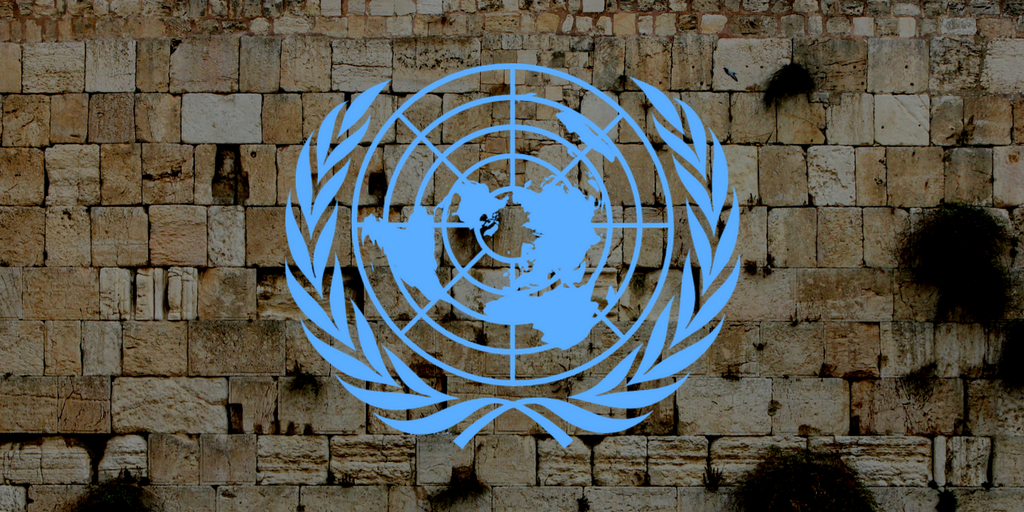Amid funding showdown, top official welcomed by BDS group
A top United Nations official is facing criticism following a recent speech before a well known anti-Israel organization that supports boycotts of the Jewish state, denies Israel’s right to exist, and has promoted anti-Semitic materials.
Elizabeth Campbell, director of the UN Relief Works Agency’s office in Washington, D.C., recently spoke before the Jerusalem Fund, a Washington-based pro-Palestinian activist group that promotes boycotts of Israel as part of the Boycott, Sanctions, and Divestment movement, or BDS.
Campbell has appealed to the Trump administration not to cut funding to UNRWA, the Palestinian aid organization that has long been criticized for employing members of Hamas, participating in anti-Israel political activism, and allowing its facilities to be used by terrorists groups. Campbell discussed the issue in a speech earlier this month before the Jerusalem Fund.
The United States has been withholding more than $65 million in taxpayer funding to UNRWA as the Trump administration considers demanding reforms to the organization or permanently reducing funding.
White House-allied policy advisers with knowledge of the talk told the Washington Free Beacon that it is just another example of UNRWA’s biased attitude towards Israel and its efforts to legitimize groups that take a hardline stance against the Jewish state.
One foreign policy official who has worked with the Trump administration on its effort to reform UNRWA said he views the speech by UNRWA’s Washington director at a BDS group as providing the group with undue legitimacy, particularly in light of U.S. efforts to reform the UN group.
“UNRWA explains away its scandals by protesting, in essence, that you can’t expect Palestinians in Gaza not to support terrorism,” the source said. “But there’s no way to explain away the Washington-based head of a taxpayer-funded group supporting a notorious hate group. The anti-Israel culture at UNRWA is toxic—and it extends from Gaza City to Washington, D.C., as this incident shows.”
UNRWA officials did not respond multiple requests for comment on Campbell’s speech.
The Jerusalem Fund regularly holds events that suggest the group’s affinity for Hamas and make explicit its support for BDS. The title of a recent event was “Hamas: From Resistance to Government.” Another was titled, “Building the BDS Movement.” Another asked, “Israel: Democracy or Apartheid State?” with the speaker endorsing the latter.
A State Department official declined to comment directly on the appearance of an UNRWA official at the Jerusalem Fund, but emphasized the administration’s efforts to see UNRWA reformed or face a further cut off in U.S. aid.
Richard Goldberg, a former senior adviser to retired Sen. Mark Kirk (R., Ill.) who helped spearhead efforts to hold UNRWA accountable for its anti-Israel advocacy, told the Free Beacon that Western nations footing the bill for the agency are growing weary of its anti-Israel activism.
“There’s a growing consensus among UNRWA’s largest donors that the time has come for fundamental changes,” said Goldberg, now a senior adviser for the Foundation for Defense of Democracies. “The agency was established nearly 70 years ago by Arab states as a political weapon in their ongoing fight to destroy the fledgling State of Israel—a war the Arab states now understand they lost.”
“Rather than keeping Palestinians in a perpetual state of poverty and hopelessness, Palestinians deserve to see a path toward prosperity and self-sufficiency,” Goldberg explained. “Before the United States hands over its next tranche of contributions to UNRWA, at a minimum the Trump administration should get a commitment from all parties to prepare for the transition of UNRWA to the Palestinian Authority in the West Bank. If the Palestinians truly want an independent state, they need to show they can step up and care for their own citizens.”
A second Trump administration adviser who works on Middle East issues told the Free Beacon that appearances such as this have become routine for UNRWA.
“No one is surprised by this, least of all the Trump administration’s UN and Middle East officials,” the source said. “Ambassador Haley has spent an enormous amount of time trying to call attention to the UN’s hostility toward Israel, which exists at every level. Of course a UN official is being hosted by a group that advocates economic attacks against Israel. They’re on the same side.”
Originally Published in the Free Beacon.






